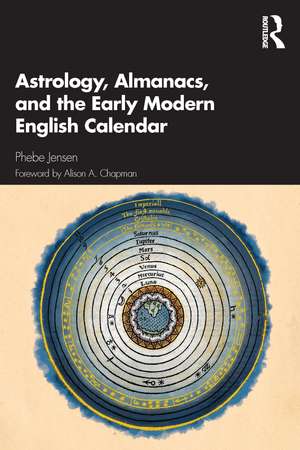Astrology, Almanacs, and the Early Modern English Calendar
Autor Phebe Jensenen Limba Engleză Paperback – iun 2022
| Toate formatele și edițiile | Preț | Express |
|---|---|---|
| Paperback (1) | 391.99 lei 6-8 săpt. | |
| Taylor & Francis – iun 2022 | 391.99 lei 6-8 săpt. | |
| Hardback (1) | 800.42 lei 3-5 săpt. | +30.13 lei 7-13 zile |
| Taylor & Francis – 23 noi 2020 | 800.42 lei 3-5 săpt. | +30.13 lei 7-13 zile |
Preț: 391.99 lei
Nou
Puncte Express: 588
Preț estimativ în valută:
75.01€ • 81.73$ • 63.20£
75.01€ • 81.73$ • 63.20£
Carte tipărită la comandă
Livrare economică 23 aprilie-07 mai
Preluare comenzi: 021 569.72.76
Specificații
ISBN-13: 9780367609290
ISBN-10: 0367609290
Pagini: 362
Ilustrații: 26 Halftones, color; 77 Halftones, black and white; 103 Illustrations, black and white
Dimensiuni: 156 x 234 x 19 mm
Greutate: 0.51 kg
Ediția:1
Editura: Taylor & Francis
Colecția Routledge
Locul publicării:Oxford, United Kingdom
ISBN-10: 0367609290
Pagini: 362
Ilustrații: 26 Halftones, color; 77 Halftones, black and white; 103 Illustrations, black and white
Dimensiuni: 156 x 234 x 19 mm
Greutate: 0.51 kg
Ediția:1
Editura: Taylor & Francis
Colecția Routledge
Locul publicării:Oxford, United Kingdom
Cuprins
List of figures, Foreward, Acknowledgements, Introduction, PART I: Backgrounds, PART II: How to read an early modern almanac, PART III: Early modern calendars, Bibliography, Index of Saints and Holy Days, Index
Notă biografică
Phebe Jensen is Professor of English at Utah State University, USA. She is also the author of Religion and Revelry in Shakespeare's Festive World (2008).
Alison A. Chapman (Foreword) is Professor of English at the University of Alabama, Birmingham.
Alison A. Chapman (Foreword) is Professor of English at the University of Alabama, Birmingham.
Descriere
The Early Modern English Calendar demystifies the multiple, often conflicting time schemes that governed the reckoning of the year in sixteenth and seventeenth century England. Through introductory essays and an easily navigated month/day calendar, the book clarifies the various calendrical schemes that governed early modern time, describes how time was literally reckoned by almanacs, prayer books, clocks and scientific instruments, and provides insight into the cultural and iconographical meaning of seasons, months, weeks, and days in the early modern calendar year.
